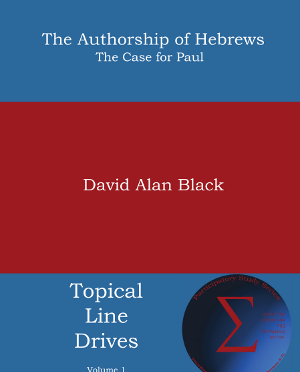Sunday, May 27, 2018
8:45 AM Hey guys, and welcome back to my little blog. I was up early this morning working on the syllabus for this fall’s exegesis of Hebrews class. It’s crazy to think that anyone can cover the entire 13-chapter epistle in one week, so I’ve forced myself (ugh) to select portions of the letter to focus on. What do you think of my choices?
1:1–4
2:1–4
3:1–6
4:1–11
5:11–6:12
7:1–28
8:1–13
9:11–15
10:19–25
11:1–7
12:1–3
13:1–6
I know that some of you who read my blog are runners and, like me, read the Bible for echoes of the sport. Some passages, such as 12:1-3, are obviously running-related, but others are less obviously so. Here I’m thinking of 2:1-4 or 3:1-6, for example. There are two principles at work in these passages. I’d call 2:1-4 “The Danger of Doing Nothing.” In other words, when you do nothing, something always happens. That’s a principle of life you can bank on. Just don’t mow the grass or change the oil in your car. As for the readers of Hebrews, they were in danger of slowly, imperceptibly drifting away from their moorings in Christ, much like a sailing vessel can drift away from a dock. During our lives as runners, we face a moment of truth every time we wake up in the morning. Running for life is a choice we have to make over and over again. Piece by piece, day after day, we are adding to the mosaic of ourselves as runners. Together, inspiration and perspiration carry us through. Every run we do can become a spontaneous celebration.
As for 3:1-6, my takeaway is another often-forgotten principle of life: You don’t have to make someone else look bad in order to make someone look good. You’ll recall that in this passage the author is comparing Moses and Christ. His goal is to show how vastly superior Christ is to Moses. Had I been given that assignment, I probably would have said, “That’s easy. No problem. All I have to do is show how Moses sinned and how Moses failed and then compare him to the sinless Christ.” But the author of Hebrews was much wiser than that. Rather than denigrate Moses in any way or attempt to “unhitch” himself from the Old Testament, he shows how Moses “was faithful in all of his household.” Moses, he says, was a super great leader, perhaps the greatest leader Israel ever knew. Then he goes on to say, almost in a stage whisper, “Pssst, and guess what? Jesus is even greater than Moses, and if He can be greater than Moses He must really be Something.” You see, the author isn’t contrasting Moses’ faithfulness with Christ’s faithfulness. Both were equally faithful. But there’s a catch: Moses was faithful as a son in the house. But Christ is faithful as the Son over the house. Thus the point of comparison has nothing to do with faithfulness but has everything to do with status. One of the reasons I love the running community so much is because it’s so affirming of every runner who makes an attempt to get out there and run — even those of us out of shape slobs who started out running at a caterpillar-like pace. The possible suddenly seems possible, and no one offers you more encouragement than people who have been running all their lives. “Trust me,” they tell you. “If I can do it, so can you. All you have to do is keep training, keep improving, and keep ignoring the naysayers.” You are living a life, my running friend, that only a short time ago would have been a complete fantasy.
Of course, in our Hebrews class, we’ll be covering these passages not in English but in Greek, and believe you me, the Greek of Hebrews can be a bit on the challenging side. But if I get the syllabus up in the next 3 weeks, that should give my students plenty of time to work ahead if they so desire. The course is by default (more than design) merely an entrée into this wonderful epistle. And in addition to exegeting specific texts, we’ll also be covering such macro-issues as authorship. Here’s what they’ll be reading on this subject.
- Allen, David L. Lukan Authorship of Hebrews. Nashville: Broadman & Holman, 2010.
- Black, David Alan. The Authorship of Hebrews: The Case for Paul. Energion, 2013.
- Guthrie, George. “The Case for Apollos as the Author of Hebrews,” Faith and Mission 18.2. (2001): 41-56.
Of course, when they read my little book, I don’t expect them to agree with me, though I hope they’ll get a glimpse of the remarkable joy of discovery I experienced as I began to study the church fathers for themselves.




